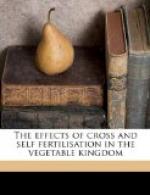It is a common practice with horticulturists to obtain seeds from another place having a very different soil, so as to avoid raising plants for a long succession of generations under the same conditions; but with all the species which freely intercross by aid of insects or the wind, it would be an incomparably better plan to obtain seeds of the required variety, which had been raised for some generations under as different conditions as possible, and sow them in alternate rows with seeds matured in the old garden. The two stocks would then intercross, with a thorough blending of their whole organisations, and with no loss of purity to the variety; and this would yield far more favourable results than a mere exchange of seeds. We have seen in my experiments how wonderfully the offspring profited in height, weight, hardiness, and fertility, by crosses of this kind. For instance, plants of Ipomoea thus crossed were to the intercrossed plants of the same stock, with which they grew in competition, as 100 to 78 in height, and as 100 to 51 in fertility; and plants of Eschscholtzia similarly compared were as 100 to 45 in fertility. In comparison with self-fertilised plants the results are still more striking; thus cabbages derived from a cross with a fresh stock were to the self-fertilised as 100 to 22 in weight.
Florists may learn from the four cases which have been fully described, that they have the power of fixing each fleeting variety of colour, if they will fertilise the flowers of the desired kind with their own pollen for half-a-dozen generations, and grow the seedlings under the same conditions. But a cross with any other individual of the same variety must be carefully prevented, as each has its own peculiar constitution. After a dozen generations of self-fertilisation, it is probable that the new variety would remain constant even if grown under somewhat different conditions; and there would no longer be any necessity to guard against intercrosses between the individuals of the same variety.
With respect to mankind, my son George has endeavoured to discover by a statistical investigation whether the marriages of first cousins are at all injurious, although this is a degree of relationship which would not be objected to in our domestic animals; and he has come to the conclusion from his own researches and those of Dr. Mitchell that the evidence as to any evil thus caused is conflicting, but on the whole points to its being very small. From the facts given in this volume we may infer that with mankind the marriages of nearly related persons, some of whose parents and ancestors had lived under very different conditions, would be much less injurious than that of persons who had always lived in the same place and followed the same habits of life. Nor can I see reason to doubt that the widely different habits of life of men and women in civilised nations, especially amongst the upper classes, would tend to counterbalance any evil from marriages between healthy and somewhat closely related persons.




